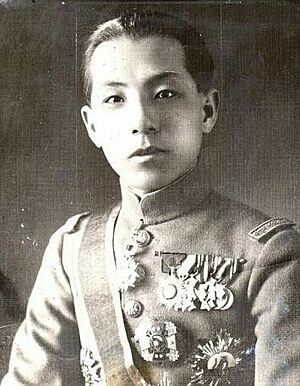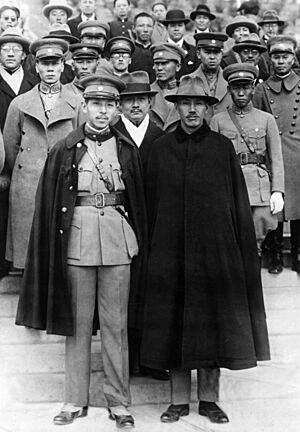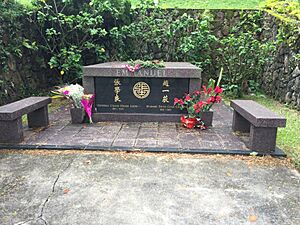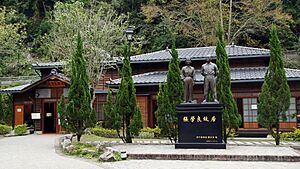Zhang Xueliang facts for kids
Quick facts for kids
Zhang Xueliang
|
|
|---|---|
|
張學良
|
|

Zhang in 1928
|
|
| Warlord of Manchuria | |
| In office June 4, 1928 – December 26, 1936 |
|
| Preceded by | Zhang Zuolin |
| Succeeded by | Office abolished |
| Personal details | |
| Born | June 3, 1901 Tai'an County, Fengtian, Qing Empire |
| Died | October 15, 2001 (aged 100) Honolulu County, Hawaii, U.S. |
| Resting place | Valley of the Temples Memorial Park, Honolulu County, Hawaii |
| Nationality | Chinese |
| Spouses |
|
| Children | 5 |
| Parent |
|
| Relatives | Zhang Xueming (brother) |
| Awards | Order of Rank and Merit Order of Wen-Hu Order of the Sacred Treasure Order of Blue Sky and White Sun |
| Nickname | Young Marshal |
| Military service | |
| Allegiance | |
| Branch/service | |
| Rank | General of the Army |
| Commands | Northeast Peace Preservation Forces |
| Battles/wars |
|
| Zhang Xueliang | |||||||||||
|---|---|---|---|---|---|---|---|---|---|---|---|
| Traditional Chinese | 張學良 | ||||||||||
| Simplified Chinese | 张学良 | ||||||||||
|
|||||||||||
Zhang Xueliang (Chinese: 張學良; June 3, 1901 – October 15, 2001) was an important Chinese leader. He was also known as Chang Hsueh-liang and later as Peter H. L. Chang. He led the region of Manchuria from 1928 to 1936. He was also the main commander of the Northeastern Army. He took over after his father, Zhang Zuolin, was killed.
Zhang Xueliang wanted to make China stronger and more united. He supported nationalist ideas. He helped bring China back together at the end of the Warlord Era. This was a time when different military leaders, called warlords, controlled parts of China. Zhang Xueliang promised to be loyal to the main Nationalist government in Nanjing.
Even though he joined the Nationalist government, Manchuria still had its own power. This changed when Japan invaded and took over the area in 1931. Zhang was unhappy with the leader, Chiang Kai-shek, who wanted to fight Chinese groups first before fighting Japan. Because of this, Zhang helped plan and lead the 1936 Xi'an Incident. During this event, soldiers under Zhang's command arrested Chiang Kai-shek. They wanted to force him to work with the Chinese Communist Party against Japan.
Chiang Kai-shek eventually agreed to fight Japan. But after he was released, he had Zhang arrested. Zhang was kept under house arrest for 50 years, first in mainland China and then in Taiwan. Even though Zhang was never a communist, the Chinese Communist Party sees him as a hero. They believe he helped end the civil war and start the fight against Japan.
Contents
Early Life and Military Training
Zhang Xueliang was born on June 3, 1901, in Haicheng, Liaoning province. He had private teachers who taught him. Unlike his father, who was also a warlord, Zhang felt comfortable around Westerners.
He went to the Fengtian Military Academy. In 1919, he became a colonel in the Fengtian Army. He was also put in charge of his father's bodyguards. In 1921, he went to Japan to watch military exercises. There, he became very interested in airplanes. Later, he created an air force for the Fengtian Army. This air force was used a lot in battles during the 1920s.
In 1922, he was promoted to major general. He commanded a large group of soldiers. Two years later, he also became the commander of the air force.
Becoming a Leader
When his father died in 1928, Zhang took over as the leader of the Northeast Peace Preservation Forces. This group was also known as the "Northeastern Army". They controlled the northeastern provinces of Heilongjiang, Fengtian, and Jilin. In December of that year, he announced his loyalty to the Kuomintang (KMT), which was the Chinese Nationalist Party.
From Warlord to General

The Japanese thought Zhang Xueliang would be easy to control. An officer from the Japanese Kwantung Army even killed his father, Zhang Zuolin, thinking this would help. But Zhang Xueliang turned out to be more independent than they expected. He announced his support for Chiang Kai-shek. This led to the reunification of China in 1928.
Some historians in China called him the "Hero of History". This was because he wanted to unite China and get rid of the Japanese invaders. He was willing to take risks for this goal. To reduce Japanese influence, he even had two officials who supported Japan executed in 1929. This was a difficult choice, as these officials were very powerful.
In 1930, other warlords, Feng Yuxiang and Yan Xishan, tried to overthrow Chiang Kai-shek's government. Zhang Xueliang supported Chiang's government in Nanjing. In return, he gained control of important railroads and customs money from the port city of Tianjin.
A year later, in the Mukden Incident of September 18, Japanese troops attacked Zhang's forces in Shenyang. Japan wanted to start a big war with China. However, Chiang Kai-shek did not want to fight Japan until his army was stronger. So, Zhang's armies pulled back without much fighting. This led to Japan taking over Zhang's former lands in Manchuria. Zhang later said he gave the order to pull back himself. He knew his forces were weaker than the Japanese and wanted to save his army.
The Xi'an Incident
On April 6, 1936, Zhang met with Zhou Enlai, a leader from the Chinese Communist Party. They planned to end the Chinese Civil War. At that time, Chiang Kai-shek thought the communists were a bigger threat than the Japanese. He wanted to defeat the communists first. He believed that "communism was a cancer while the Japanese represented a superficial wound." Many Chinese people were angry about Japan's actions. This made Chiang's plan very unpopular. This anger led to Zhang's actions in the Xi'an Incident.
In December 1936, Zhang and General Yang Hucheng kidnapped Chiang Kai-shek. They held him until he agreed to form a united front with the communists. This alliance was meant to fight against the Japanese invasion. After two weeks of talks, Chiang agreed to work with the communists to drive Japan out of China.
After Chiang made this agreement, Zhang flew back to Nanjing. This showed that he was acting in good faith.
Life Under House Arrest
As soon as Zhang landed in Nanjing, Chiang had him arrested by military police. Zhang wrote a letter to Chiang, apologizing for his actions. He admitted that what he did was wrong and asked to be punished. Zhang meant for the letter to be private, but Chiang published it to make Zhang look bad.
Zhang was put on trial. He was found guilty of kidnapping Chiang and trying to change government policy. He was sentenced to ten years in prison. However, Chiang pardoned him a few days later, on January 4, 1937. But Zhang was not allowed to have his civil rights back and remained under special detention.
In Mainland China
For the first few years, Zhang was moved often from place to place. Chiang Kai-shek kept a close eye on him. His first wife, Yu Fengzhi, joined him. Zhang was allowed to use his bank account. He was expected to pay for most of the costs of his detention. In 1940, Yu Fengzhi became sick and was allowed to go to the United States for treatment. They never saw each other again, but they continued to write loving letters. In 1964, Yu agreed to divorce Zhang so he could marry Zhao.
In Taiwan
Zhang was later taken to Taiwan. He remained under house arrest there until Chiang Kai-shek died in 1975. During this time, he studied old Chinese literature and the Manchu language. He also collected Chinese art, like fan paintings and calligraphy. His collection had over 200 pieces.
Zhang also studied the New Testament and became a Christian. In 1964, he officially married Edith Chao. She was the daughter of a high-ranking official. She had become his companion when she was a teenager and followed him into exile. Zhang and Edith went to church services with Chiang Kai-shek's family. On March 26, 1988, Zhang was officially set free. This happened two months after Chiang Kai-shek's son, Chiang Ching-kuo, died.
Later Life and Passing

In 1991, Zhang traveled outside of Taiwan for the first time since his release. He visited San Francisco to see friends and family. In 1995, Zhang moved to Honolulu, Hawaii. He lived there with his younger brother, Chang Hsueh-sen. Many people asked him to visit mainland China, but Zhang said no. He mentioned his close ties to the KMT and his poor health. However, he was named the honorary President of Northeastern University in 1993. He had been the actual president there from 1928 to 1937. He was also named honorary chairman of Harbin Institute of Technology in 1993.
In June 2000, Edith Chao passed away at age 88. Zhang died on October 14, 2001, from pneumonia. He was 100 years old. His funeral in Honolulu was attended by people from both China and Taiwan.
Awards and Honors
 :
:
 :
:
 :
:
 Commander of the Legion of Honor
Commander of the Legion of Honor
 :
:
 Order of the Rising Sun
Order of the Rising Sun Order of the Sacred Treasure, second class
Order of the Sacred Treasure, second class
Family Life
- Parents
- Zhang Zuolin (1875–1928), Zhang's father, a warlord of Manchuria, killed by the Japanese.
- Zhao Chungui (趙春桂) (?–1912), Zhang's mother.
- Spouses
- Yu Fengzhi (Chinese: 于鳳至; Wade–Giles: Yu Feng Tze) (c. 1899–1990), Zhang's first wife (married 1916; divorced 1964). She moved to the U.S. in 1940.
- Gu Ruiyu (谷瑞玉) (1904–1946), Zhang's second wife (married 1924; divorced 1931).
- Zhao Yidi (Chinese: 趙一荻; Edith Chao Chang) (1912–2000), Zhang's companion and later his second wife (married 1964). She moved with him to the U.S. in 1995.
- Children
- Pauline Tao, born Chang Lu-ying (張閭瑛 Zhang Lüying) (c. 1916–), eldest daughter born to Yu, lives in the U.S.
- Martin Chang Lu-hsun (張閭珣 Zhang Lüxun) (c. 1918–1986), eldest son born to Yu, died in Taipei.
- Raymond Chang Lu-yu (張閭玗 Zhang Lüyu) (c. 1919–1981), second son born to Yu, died in Los Angeles, CA.
- Chang Lu-chi (張閭琪 Zhang Lüqi) (c. 1920–1929), third son born to Yu.
- Robert Chang Lu-lin (張閭琳 Zhang Lülin) (1930–), son born to Chao, lives in the U.S.
- Siblings
- Zhang Xueming (1908–1983), joined the Communists, died in Beijing.
- Hsueh Tseng Chang (張學曾 Zhang Xuezeng) (1911–2004), died in Novato, CA.
- Zhang Xuesi (張學思 Chang Hsueh-ssu) (1916–1970), joined the Communists, died in China.
- Henry Chang Hsueh-sen (張學森 Zhang Xuesen) (1920–1995), died in Beijing while visiting.
- Zhang Xuejun (張學浚 Chang Hsueh-chun) (1922–1984), died in Taiwan.
- Zhang Xueying (張學英 Chang Hsueh-ying) (1924–?)
- Zhang Xuequan (張學銓 Chang Hsueh-chuan) (1925–1992 or 1996), died in Tianjin.
See Also
 In Spanish: Zhang Xueliang para niños
In Spanish: Zhang Xueliang para niños
- Warlord era
- History of the Republic of China
- Military of the Republic of China
- Politics of the Republic of China
- Sino-German cooperation (1911–1941)
 | John T. Biggers |
 | Thomas Blackshear |
 | Mark Bradford |
 | Beverly Buchanan |


